Test Drive Diary - 2023
Case Record No.4/202324.04.2023 N69°07'00", W105°03'55". Odometer reading 1650 km.
Three days in Cambridge Bay, hot water supply, the damned Internet, and the workshop again. The day after our arrival the main travelers left us: comrades Andrei Ivanovich Komri-Picard, Zurab Sanikidze and Alexey Safonov. We don't have time for dawdling, so we spend all the time in the garage, fixing, improving and deepening the vehicles as much as we can. During the trip, the members were free to record their thoughts on this subject matter, now it is time to implement the resulting multi-volume document. Another important task is: the list of spare parts needed for the next year. Purchasing them and delivery to Canada have become significantly more complicated over the past year, but we will try our best. Based on the results of the trip, the following is clear:
- Fuel consumption is – 30 L/100 km with a loaded trailer over snow ridges of average lousiness, sometimes over considerable hummocks.
- Foodstuff consumption – 153 kg out of 190 kg taken; by the end of the journey the doctor, with carefully concealed despair, began to distribute, with unwholesome generosity, the gourmet items saved for unknown reason.
- Consumption of gas in cylinders for the kitchen was 2.5 times less than the calculated amount, two-thirds of the cylinders returned to the starting point.
Enormous overabundance of personal clothes was revealed for some polar explorers. We declare a holy war against hedonism. Asceticism – that is our motto! Next year, the task is to reach the North Pole and then Greenland, rather than get drown in the Arctic Ocean due to unhealthy excesses. The proposals to retrofit the ATVs with coffee machines, boilers, etc. sometimes drive me into a stupor, but ... a pill against nervousness under the tongue, and the sky is blue again, we continue working. But the sadness of parting with comrades-in-arms gradually faded, the thoughts are occupied with ATVs, because they are the real heroes and plodders. Requests, tables, schedules and deadlines are coming from the headquarters, all of them have to be filled-in, and it is unavoidable. We send the dimensions of the body planes for advertising stickers. Now, about the route. We were incredibly lucky with the weather, only once the whiteout was really white; there were no snowfalls and blizzards, the drones were flying, making photos of us, bears and bear cubs, sea hares, polar hares and other hares. Crossing overland twice from one water area to another, we crossed freshwater lakes with transparent ice of fantastic beauty, collected the ice, as water from it is much tastier than snow distillate. We saw many ice figures in the hummocks and snowdrifts. We sailed in a man-made water opening in the ice, admired the expression of the driver's face, plunging for the first time in the black icy abyss. Plunging and getting out were successful. Regrettably, the evenings during the stops were often spoiled by Starlink and Iridium installations, not everyone had the strength to do without the Internet if only for one evening. Despite the noise of the engine, we are still talking on the move, while on the stops most of the workpeople instantly disappear in the black hole of the information field. By the next year, it would be good to approve the schedule for access, similar to water supply in a remote Somali village or to electricity supply in the freezing Europe. Anyway, the order must exist.
That's how the matters are. Yours, V.Ye.
21.04.2023 N69°07'00", W105°03'56". Odometer reading 1650 km. We are in Cambridge Bay.
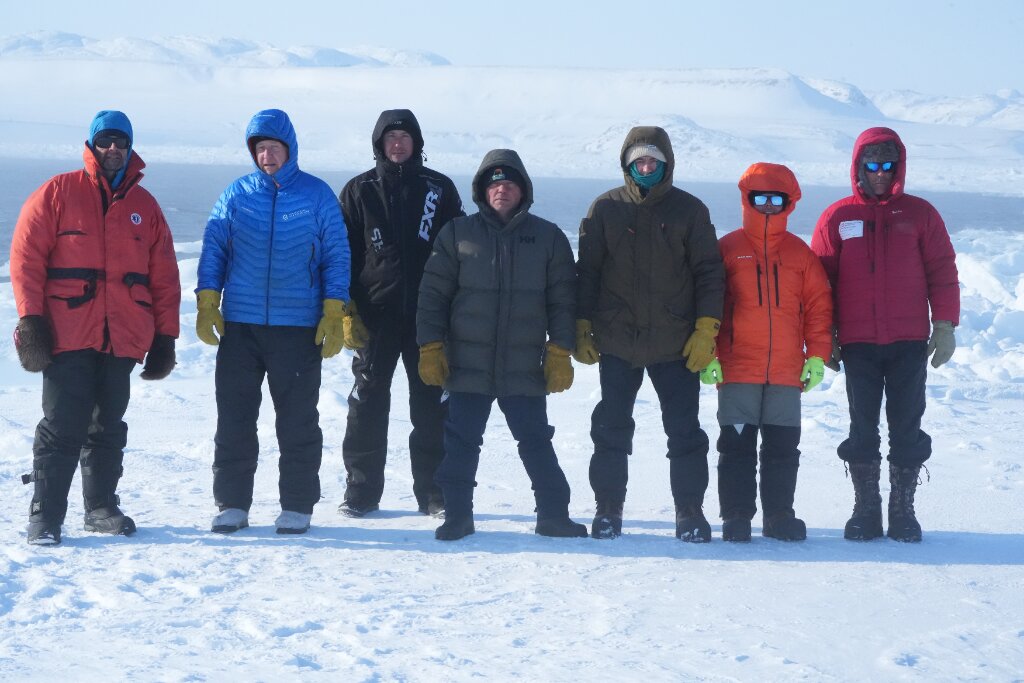
We departed in the morning in due time, at 7.00, again following the trail of electric Nissan and the two six-wheeled Emil Grimsson’s Fords escorting it; electric good-lookers have a contraindication for driving solo over such terrain, they can fail at any moment. One feels more at ease with two diesel brutes nearby. At midday we drove on the land, met a hare, a brave creature, unlike the bears. A vehicle approached him at a distance of about five meters, no more, he stopped, looked at us and continued to gnaw calmly the remains of either moss or lichens from a stone, without paying attention to the three other ATVs that had arrived. The members came to a common opinion that either he is a dunce who had never seen humans and vehicles, or he stands for election as the leader of the tribe, and uses the occasion to demonstrate bravery and prowess to his congeners. We drove further on, but after this encounter we were ashamed of our feeble-mindedness and, leaving the trail made by the others, we made our own trail across tundra. In this manner, we drove to the outpost of civilization at 16.00. Today and tomorrow morning there is a search of the team: the doctor confiscates the remaining foodstuffs in the hope to calculate the amount of eaten foodstuffs and their assortment, in preparation for the next year's trip. The main thing in this investigation, as they say, is not to go out onto yourself. Andrew, Zurab and Alexei Safonov are leaving us tomorrow, force majeure circumstances are drawing them to the mainland. We remain to perform maintenance of the machinery, clarify the lists of spare parts, draw up a list of what is needed for next year. The tasks of the test drive were completed, the people are safe and sound, so everything is not bad...
That's how the matters are. Yours, V.Ye.
20.04.2023. N69°31'52", W102°32'30". Odometer reading 1526 km. Clear sky, gentle NE breeze.
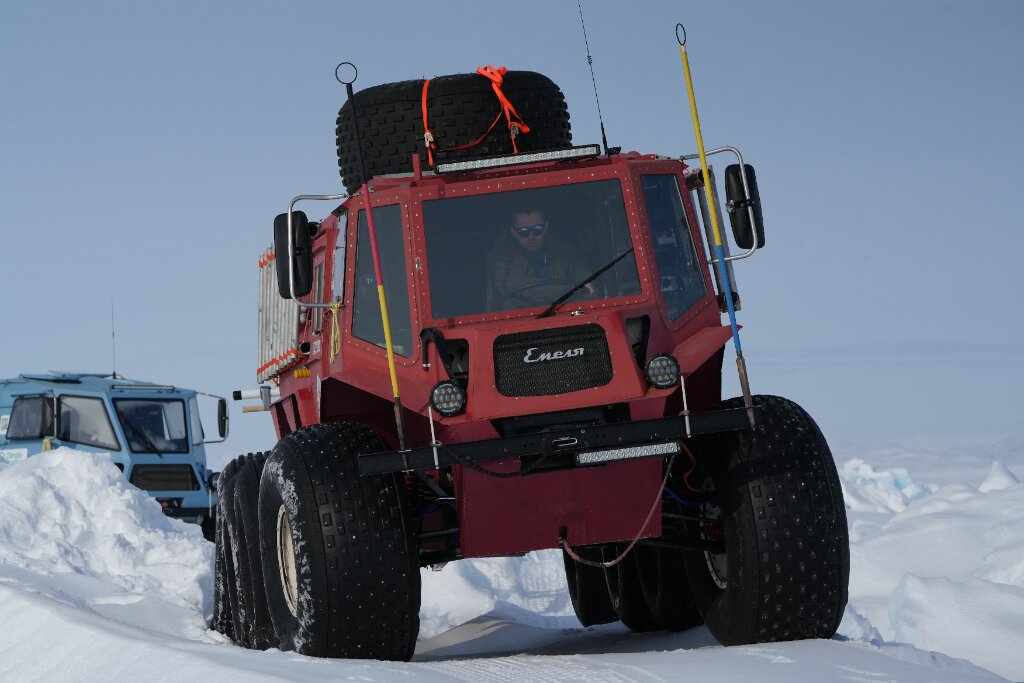
All day long Š driving over snow ridges across the furrows. At midday we met partly covered tracks of electric people (I wrote about them in the previous posts). The tracks are quite visible, and we drove following them. We realize that it is purely nervous - to follow the tracks of someone else, though probably we would have chosen the route no worse, and maybe better. All in all, we are moving ahead. A couple of times we saw bears, they are easily frightened, run away in good time, don't expect anything good from meeting humans. We stopped for the night earlier than usual, at 7 p.m., because a cooling system pipe burst in the red vehicle, they are replacing it. Alexey Safonov cooked fish soup for the whole team, he cooked it outdoors, the doctor does not tolerate fish smell in the vehicle. So the day passed in petty bustle.
That's how the matters are.V.Ye
19.04.2023 N69°52'38", W100°04'18". Odometer reading 1408m.
The day is clear, the wind is moderate, ice is smooth for the most part, so the entire day passed. Cedric confirmed the hotel and the workshop for us starting from April 21st. We expect to arrive in Cambridge Bay at noon of the 21st. In fact, thatÕs all for today.
With greetings, V.Ye
18.04.2023 N70°53'32", W097°18'52". Odometer reading 1248 km.
The weather is cloudy and bright. At noon we approached the island of Tasmania, the place of the last year's accident. In August we were here, participating in extraction from the sea floor of the drowned vehicle. Nothing has changed during the year, the strong current is still flushing the ice from below so much that the sea floor is visible to the naked eye not only of a human being - the apex of creation, but also of the most ordinary bearded seals, squareflippers. A couple of such good-lookers were sunbathing on the ice about a hundred meters from us. It is worth mentioning that they watched us with interest, and there was something to watch, really. Four vehicles drove up to a section of thin ice, one of the vehicles began to drive over the same spot hoping to break through. After all, the spectators (i.e. us) got bored of it, and we started breaking the thin ice with ice shovels. Finally, the vehicle broke through, it was hooked with a rope, and another ATV pulled it out onto strong ice. It was done quickly and somewhat prosily. Then we tried another method of pulling out the vehicle on a high bank, then gathered and drove further, leaving the bearded seals in the state of utter amazement. Almost immediately whiteout occurred, and small hummocks appeared. In the conditions of absolute absence of visibility of terrain, driving becomes an interesting adventure. In case of doubt about ice strength the vehicles drove each by its own path, because the vehicle riding over weak ice damages it, and the following vehicle may break through. By the evening the weather improved, the world took its usual contours, and so the workday was finished.
That's how the matters are. With regards, V.Ye
17.04.2023 Monday. N71°42'58", W095°34'27". Odometer reading 1130 km.

It is warm. We arranged bivouac on the northwestern extremity of the Boothia Peninsula, on the ice of the Franklin Strait. On Monday mornings conferences are held in Zoom, the state of affairs is reviewed, everyone are praising themselves trying to show their merits modestly, but intensely. The bosses on the mainland are very interested in the quality of communication, and it had been high... until these questions were asked. The Germans call it Generaleffekt, you know. As soon as we started swaggering about it, the satellites immediately piled off to unknown destination. In short, we were disgraced. Then we continued sadly our way towards the passage across the Boothia Peninsula by land. The Bellot Strait does not freeze, the velocity of tidal streams in it reaches 15 km/h, ice does not grow under such conditions, so the strait is impassable for us; besides, the local authorities made us promise not to go there. We saw bears, including a loving mother with a cub. She didn't like the unfamiliar flying trash trying to get closer to her baby, she deftly managed to stay between the baby and the danger every time, she even tried to attack the copter. Then there was a small pass, and we found ourselves in a picturesque valley leading to a long narrow fjord, by which we drove into the Franklin Strait in the rays of the setting sun, where we lodged for the night. In the evening we sliced frozen fish waiting for bears coming to the smell, but they did not come, and the night passed quietly.
That's it. Yours V.Ye
16.04.2023 N71°01'22", W093°29'05" Odometer reading 1028 km.
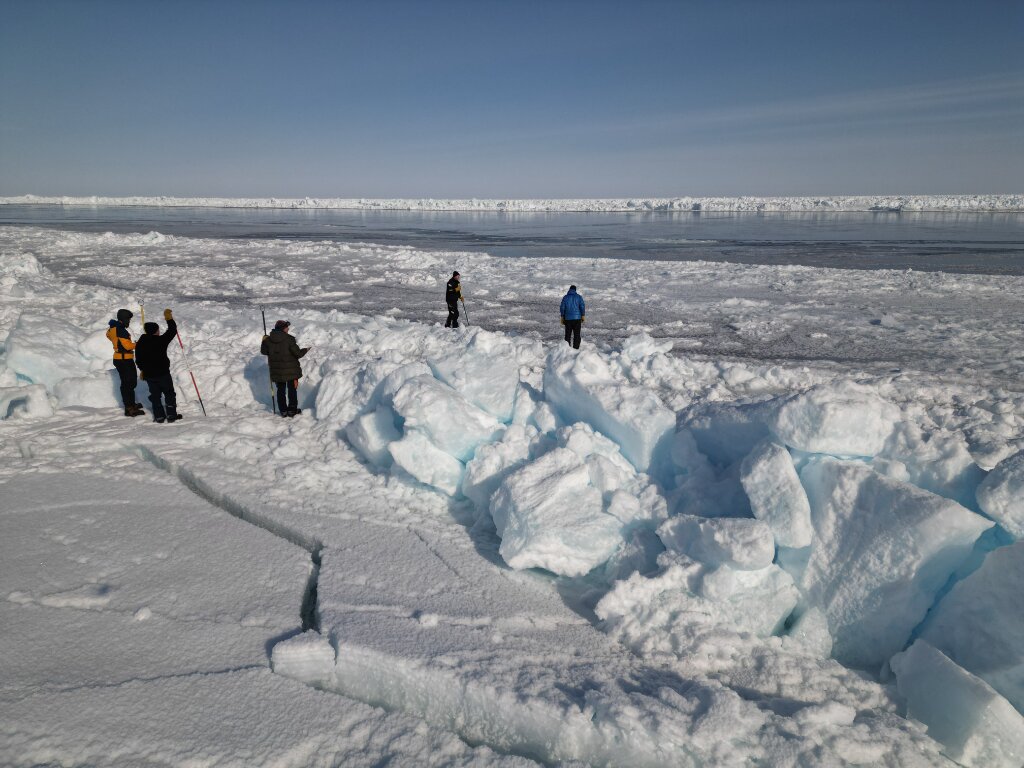
. The night was cold, during the day it got warmer, -18°, practically no wind. Today is the Orthodox Easter. The plan for today is: to drive eastward from the place of overnight stay in search of open water, find a suitable polynya and train the procedure of overcoming it with preparation of all the necessary equipment, distribution of roles Š in general, to arrange everything properly, as should be in self-respecting labor collectives. All day long Š hummocks intermittent with ice fields, classic terrain painfully familiar to any polar explorer. We have two copter pilots in our team, Anton and Maxim. Anton led his copter to the east, discovered open water 15-20 km away. We drove there; a polynya is about 150 m wide, with intensely hummocked shores, and also covered with young ice - nilas, the shores move relative to each other at a speed of 1-1.5 km/h. The speed is not high, but if something goes wrong during the crossing, fixing it will be extremely difficult. Looking at these gloomy shores piled with blocks of ice over two meters high, the idea of navigation did not cause much enthusiasm among the working masses. Frankly speaking, we always tried to avoid crossing water in such conditions. After driving a dozen kilometers along this gap, we went to take a closer look at it. The polynya disappeared, huge masses of ice began to move and, unable to stop, continued to pile up gigantic hummocks, or rather mountains of ice, in front of our eyes. The sight is fascinating, a hummock about seven meters high is moving towards you, huge blocks of ice are falling down, and all this with a very impressive accompanying sound. The photo session, it should be noted, was a success. After watching the process of creation of the ice world for half an hour, we drove back to the camp site, to discuss our courage and heroism in warmth and comfort..
That's how the matters are V.Ye
15.04.2023 N71°59’35’’, W094°02’40’’,odometer reading 994 km. It is clear, the wind is reasonable, -25-30°.



We covered not much during the day, about a hundred kilometers, over the last 20 km before Fort Ross the ice is heavily trampled by bears, many traces were made by cubs, mostly in the direction from the coast to the east, to polynyas. About 30 kilometers remain to open water, to the ice cracks. The task for tomorrow is: to drive to a polynya, work out its traversal by the entire labor collective, find a nursing mother with a cub; the cameraman said that he would not leave without filming these plots. We launched the copter fly over the ice, to see how hard our path to the heights of documentaries will be tomorrow, but it didn't fly far, too cold for the poor thing. Now, about Fort Ross: it was a trading post of Hudson's Bay Company. The company was founded in 1670, before origination of Canada as a state. By the way, in Russia, in a similar outback, a trading settlement – Mangazeya was founded in 1601, the goals were the same, trading with the locals. Fort Ross today is represented by two abandoned buildings, one is a shop with a warehouse, the other is a residential building. The date of Fort Ross appearance is 1937. In the residential building that is empty for 75 years already, fresh traces of a bear were found in the snow (the windows have been knocked out) who desperately searched for something edible, apparently he was very hungry. Having captured on video and photographic film everything we saw, we drove to the sea, to prepare gear for practicing skills in overcoming the polynyas. For dinner – steak from nelma, tea with strained cranberries, chocolate, nuts optionally; in general, everything is as ascetic as always.
Till next communication sessionģ V.Ye
14.04.2023 N71°27'37",W093°11'28".Odometer reading 898 km, just over 70 kilometers remain to Bellot Strait and Fort Ross.
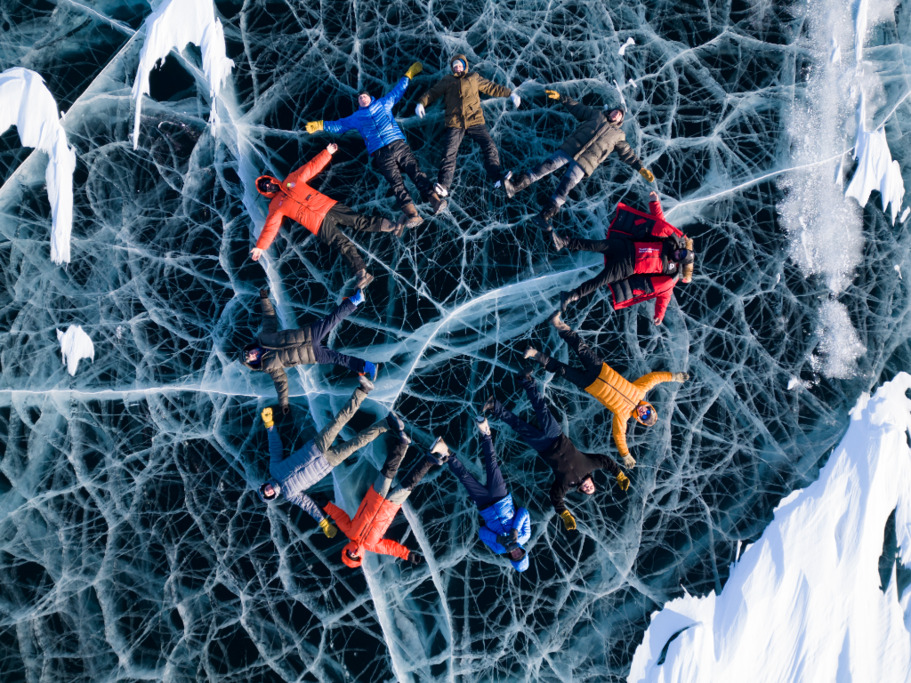
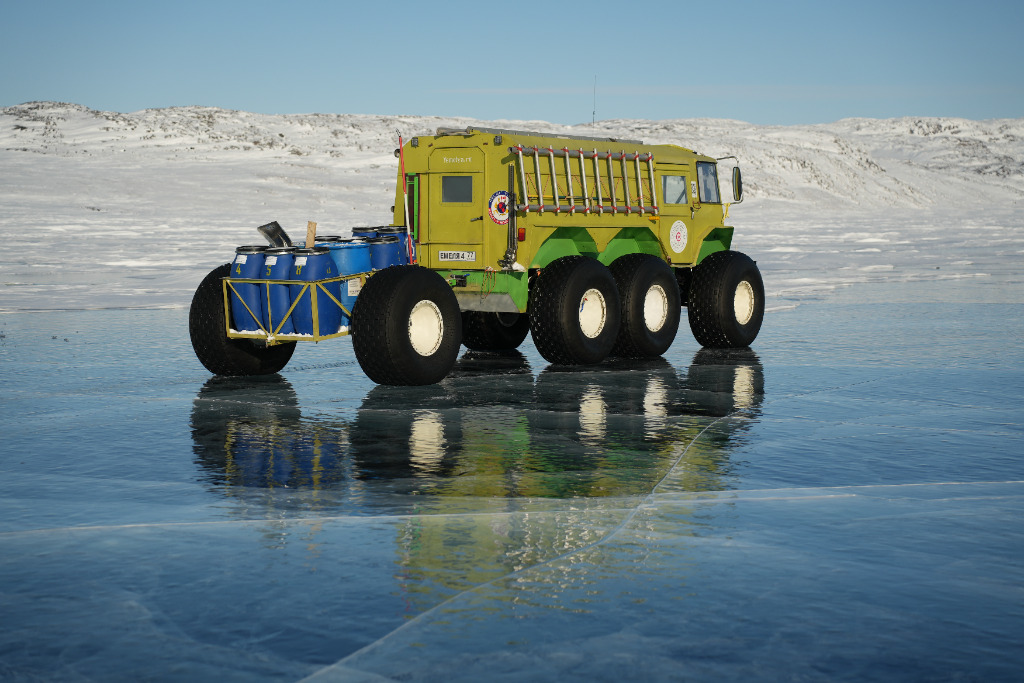
The day turned out to be excellent. A freshwater lake was waiting for us on the pass, with ice remarkably beautiful and transparent to a depth of several meters. We collected proper ice for the household; it is said that melt water is very healthy. We descended to the sea along a picturesque valley. Soon a snowmobile with a sleigh caught up with us, a father and son, relatives of George the hunter who was unwell. They all are relatives here, maybe even too much. The Gulf of Boothia, along the western coast of which our route lies, was named after the brewer Felix Booth who supported with a purse the expedition of John Ross in exchange for perpetuating his name on the world map. By noon, fields of hummocked ice appeared, the further to the north, the more hummocks. Traces of bears are met from time to time, perhaps spots of open water are present seaward. We drove into the zone of hummocks, launched the copter, raised the ladder, but no open water was visible. We decided not to waste time, we are heading to Fort Ross, open water will definitely be there, and we will swim there. We can assign a couple of days for these drills combined with the search for mother bears. For the second day already it is substantially cold in the evening, the temperature on the floor inside the vehicle in the morning is considerably below zero. In the morning, at five o'clock, the most fearless of us thrusts his arm out of the sleeping bag and turns on the cabin heater, and in a quarter of an hour the person who is accredited to make coffee gets up. So a hard working day of polar nomadic folk begins, full of asperities and hardships.
With greetings, V.Ye.
13.04.2023 N70°08'19", W091°48'. Odometer reading 731 km.

Clear, no wind, it's wonderful. The hotel in hospitable Taloyoak was left without regrets, everyone suddenly wanted to head for tundra. The hunter George came in the morning to tell us that he has problems with health, and wished us a happy journey. He saw us off to the outskirts of the settlement, and finally we drove towards the sun and adventures. All day long it was rather sparse in regard of adventures, we drove over a snowmobile trail, but were rewarded by the weather and the sights. After reaching the sea, we drove along the coast; the condition of the ice is good, though the snow ridges are slightly irritating. We are driving with the hope of seeing the engine from the ship "Victoria" of John Ross, the expedition of 1829-1833, on the coast. We visited the bay of Tombey; a wooden Catholic chapel is standing on the hill, a household outbuilding is nearby. In the 19th century, it was a reception center of one of the trading companies, neighboring a small Inuit settlement. All this is abandoned now. We stopped for overnight on the ice before tomorrow's ascent to the isthmus of the peninsula. We are taking a shortcut, a snowmobile trail leads up, the locals also do not like to wind up extra distance on the tracks of their vehicles. The last few kilometers before overnight stop the ice was completely flat in the wind shadow under a steep slope, we managed to ride as quick as the wind. In the evening we strolled up to the lake, saw caribou and wolf trails on the way. All is well, the food chain in action, the most important is to avoid getting integrated into it.
That's how the matters are. Yours, V.Ye
12.04.2023 N69°32'20", W093°32’29" Odometer reading 592 km.
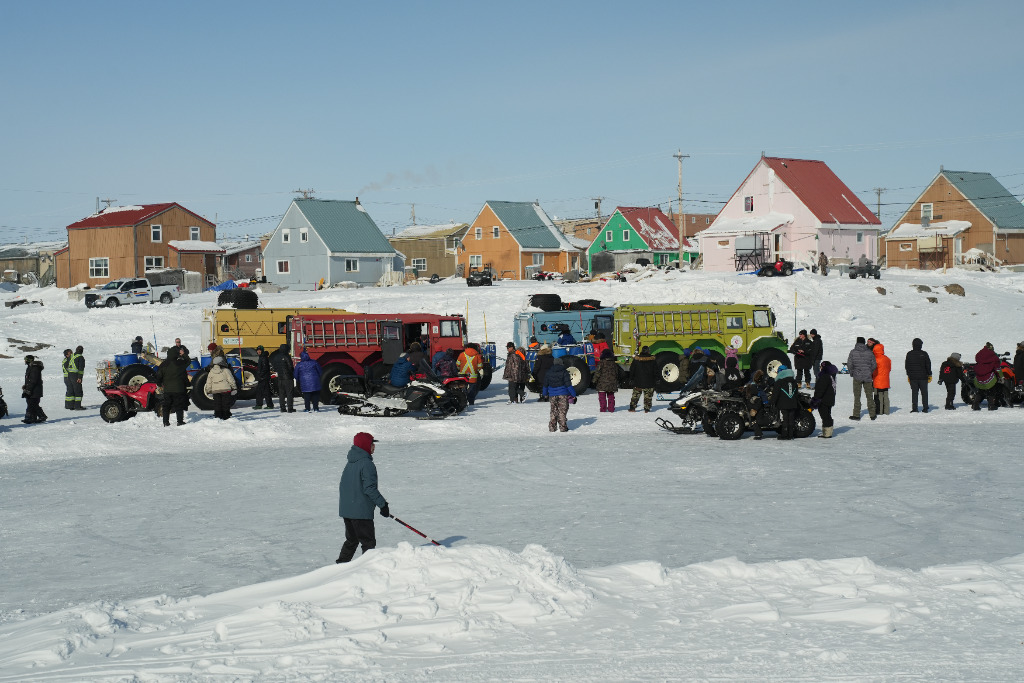

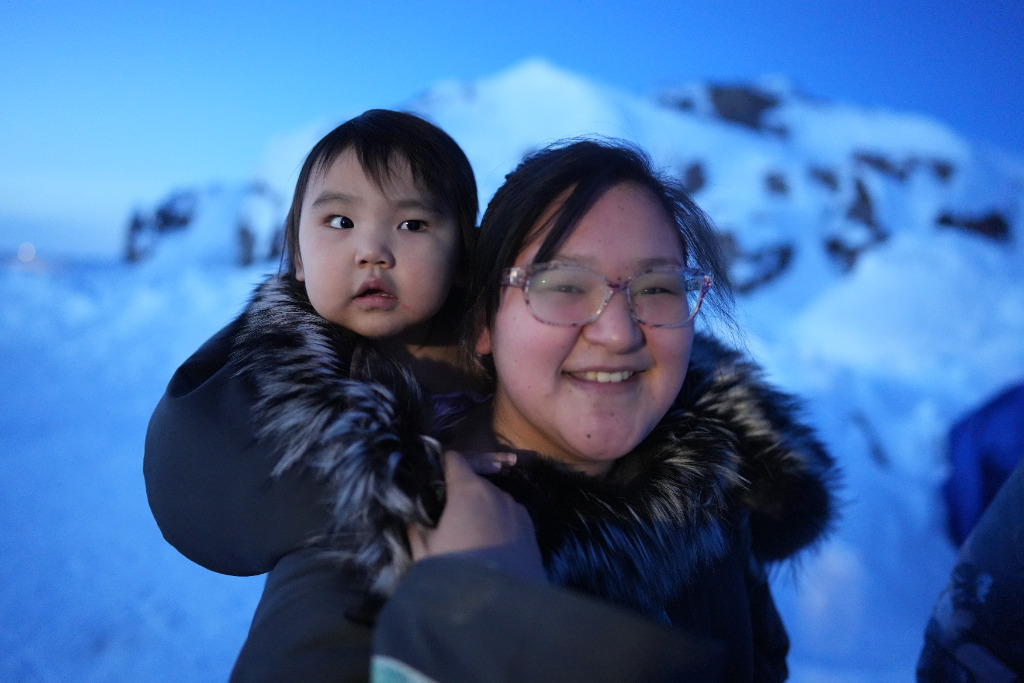

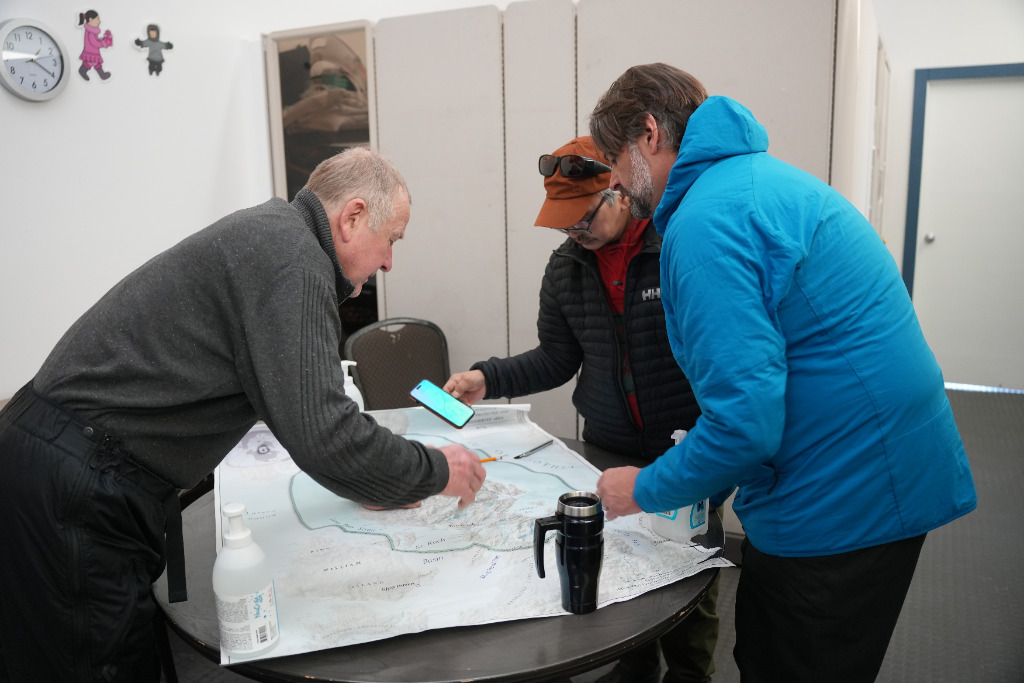
Clear windless weather. Since morning, -28°C. At 10.30, we arrived to Taloyoak. The permission to visit the territories of the community has been obtained, almost all population of the settlement met us, even the lessons at school were interrupted to let the kids see us. About 10 of them were sitting in each vehicle. The adults also showed keen interest in the machinery. There is a skating rink on the central square, a special vehicle cleans the ice. The boys are chasing the puck. There is a sports center here. We stay overnight. Departure is at 7.00 tomorrow. There were six free rooms in the hotel (out of six), again we enjoy hot water supply. George, a local hunter, will be with us further on till Cambridge Bay. He will show us the local paths and trails. In my opinion, the chosen route is interesting, in regard of landscape as well as in regard of history. From tomorrow and till the end of the journey, we will be in unpopulated area, and this is good: short stops in the villages somehow throw off the track, you just tune to the nomadic way of life – and again the folk, shops, hotels. So, our tasks for the next 12 days are: not to break the machinery, to train the team in overcoming a polynya (opening in the ice) several times, to drill the extraction of the first vehicle that broke the field of fresh ice. To make historical photos and videos. SO FAR, satellite communication systems are working excellently, we’ll see what will happen further to the north.
That's how the matters are. Yours, V.Ye
11.04.2023 N69°15'19",W094°23'35" Odometer reading 544 km.
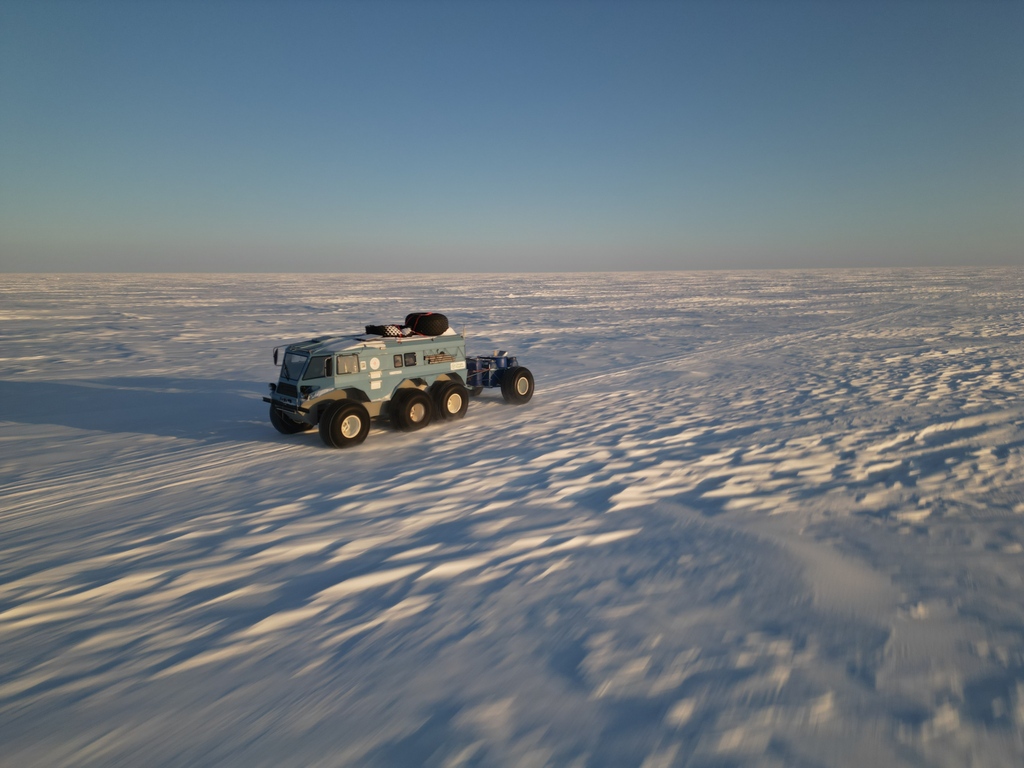
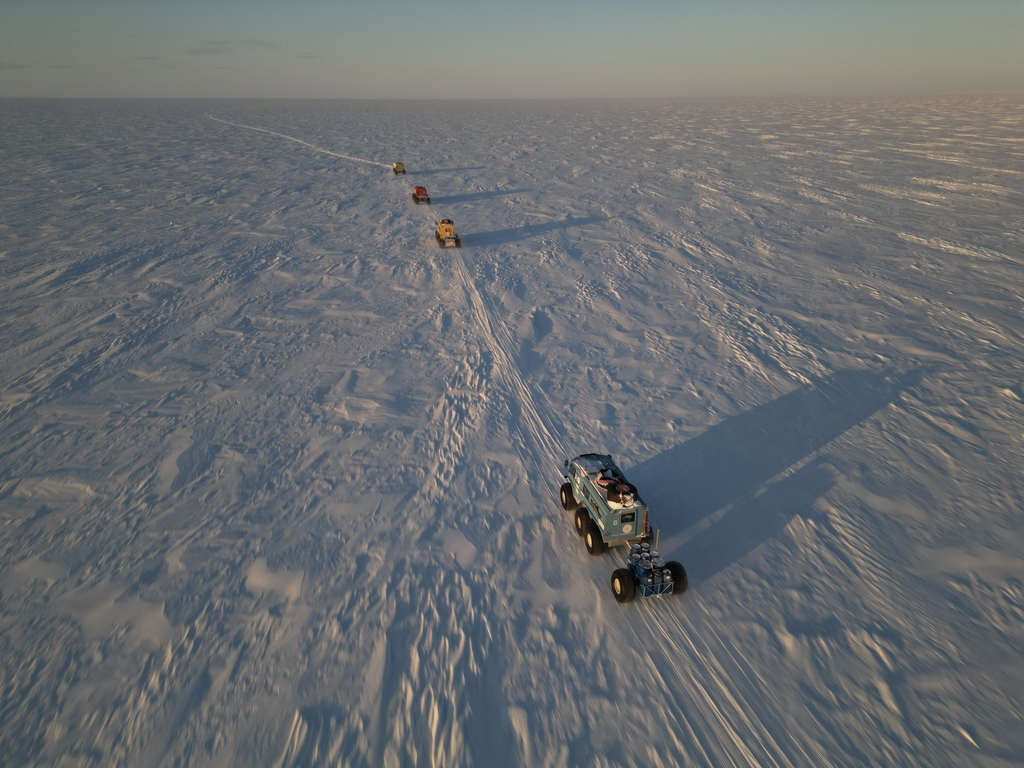
Today 100 km were covered in 5 hours of driving. Zastrugi (snow ridges) and heavy trailers do not allow moving faster. The weather is good, the spring is felt. We took 300 liters of fuel in Gjoa Haven, this is more than needed, but we hope for real adventures, and in this case it is better to prepare soundly. This morning I spoke with local hunters; the bears are already coming out and bringing the kids out. Footprints of a nursing mother of size 67 in the snow and next to them – a couple of chains of footprints the size of a dollar coin look very touching. All day today we are driving over a snowmobile trail, during the day we saw a dozen snowmobiles, in short, it is a highway by local standards. The distance to Taloyoak is 45 km, communication with Zurab was just before now, he is already there, the permission to cross the Boothia Peninsula over the lands owned by the community was received. Tomorrow before noon we will take on board him and the hunter who will help Zurab to keep circular defense against bears. They are rumored to be extremely cunning and insidious here. The vehicles play almost no pranks, the evil spirits in the form of air pockets in the cooling systems of blue and yellow vehicles were driven away finally, and the business is looking quite well.
That's how the matters are. Yours, V.Ye.
09.04.2023 N68°37'32", W95°52'20"" Odometer reading 444 km. Gjoa Haven
The weather has improved, it has got colder, the sky is clear. Two nights will be spent in the hotel. We tidied ourselves, reviewed the satellite images of the area. They adequately show the condition of the ice. A meeting was held in the evening, we discussed further plans; there are two of them – to move north to Fort Ross along either the eastern or the western coast of the Boothia Peninsula. It depends upon the state of the ice and on the permission of Taloyoak village community council to cross the peninsula over their land. The plans for tomorrow are: to tinker a little in the vehicles, and construct a bracket for the ice radar. The material is available, the work is a short one. We calculated the fuel consumption, it is 25 L / 100 km. Not bad at all for off-road driving with a trailer, quite satisfactory.
That's how the matters are. Yours, V.Ye.
08.04.2023.
On the previous day the Internet gave a forecast (our thanks to Elon Musk), wind up to 8 m/s, -18°C, light snowfall. The working people calmly went to bed, and in the morning everything matched the forecast, but with a slight adjustment: the whiteout, or “belaya mgla” in Russian. This is a state of the atmosphere when there are no shadows, and we cannot see the terrain. Those who understand will sympathize. Slowly, but steadily we drove till 10 a.m., when thermostat failed in the red vehicle. The crew had two hours for replacement, all the rest had a lunch and browsing over the Internet. The times of personal contact have fallen into oblivion. Again driving by instruments, almost no visibility, the wind has increased. Yesterday the idea of driving at night was discussed, but the team apprehended it without enthusiasm, and I did not insist. Being led by the staff was not the best choice, I will bear it in mind for the future. The terrain is: ice fields mixed with ridges of hummocks, overcoming which in the absence of visibility causes extra efforts. When riding across one of such ridges, the drive shaft of the right front wheel on the blue vehicle was damaged. We stop, replace the item. The time is 4 p.m., the passed distance by this time is 40 km. Not much. At 6 p.m. we continued driving in the whiteout. With the onset of darkness, in the beam of headlights the world took shape again, and our caravan moved forward much more cheerfully than before. We drove in shifts, and by 5 a.m. were already close to our goal. The conclusion: if there is a probability of whiteout, it is necessary to drive without stopping whenever possible. In the morning of the 9th of April we were already in Gjoa Haven ( ) – this is how the name looks in the Inuit language. The village was named after the schooner of the famous polar explorer R. Amundsen who spent winter here in search of the Northwest Passage.
) – this is how the name looks in the Inuit language. The village was named after the schooner of the famous polar explorer R. Amundsen who spent winter here in search of the Northwest Passage.
That's how the matters are. Yours, V.Ye.
07.04.2023 N68°33'21", W100°02'33" Odometer reading 250 km.
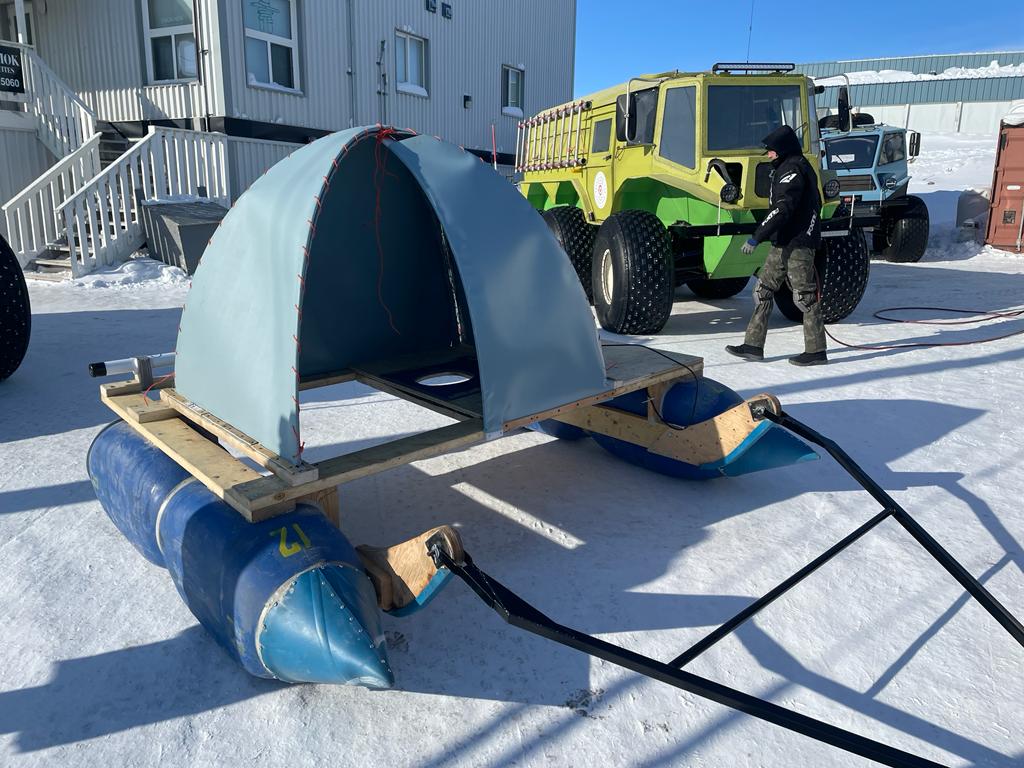
The first full day of the ride. The distance covered today: 175 km. Little by little, we are getting used to the travel. We are heading east along the Victoria Strait. The weather is good. The state of ice is varying from small zastrugi to hummocks of average nastiness. This is good, the conditions are close to real, and fuel consumption can be regarded as credible. The vehicles are moving well enough; Alexey Zaitsev (the red vehicle) by form of tradition comes to us in the green vehicle with complaints that all the time the towing capability of his vehicle is worse. Zurab has got the first and unforgettable experience of working with peshnya (ice chisel), he has split an ice block and overcame the obstacle. In the afternoon, the skid that we had constructed for towing the ice radar broke down. The polyethylene of blue barrels, which seemed to me very resilient in the cold, failed to endure the endless bumps and blows against rigid zastrugi and ice blocks and broke down. By the next year, we will try to tackle the problem and think up how to do better. We, at least the crew of our vehicle, do not eat up the planned food ration, a kilogram of foodstuff per person per day. The distance remaining to Gjoa Haven is 190 km; I think we should get there by midday of April the 9th.
That's how the matters are. Yours, V.Ye.
Case Record No.3/2023
05.04.2023 Cambridge Bay. Meteorological conditions are unchanged.
There is a full moon tonight, it's nice to howl at it, the time now is such that you need not restrain your temper, people will understand. The crew members are slowly gathering, Alexey Safonov arrived yesterday, a gentleman positive in all respects, a yacht skipper, a pilot of motorless flying vehicles. He came from Thailand, tanned, but with noticeable signs of fatigue from excessive sun. Making no secret, he rejoices the invigorating frost (-30°C, as usual), the romantic landscape of the ice desert, the upcoming travel, the dog choir in the evenings. He is in the project from the very beginning, participated in the tests of the green vehicle, that time we drove along the beds of frozen streams in the Ural taiga, spent the night in a hunter’s hut, a Russian bath, submersion in an ice hole, everything as it should be. He mastered the driving of ATV quickly, as well as polar nomadic way of life. He rides in the vehicle with the doctor; he is the organizer of the space. He is in charge of cooking fish soup and stroganina. He keeps a log of technical stops, the guideline document for further enhancement of our machinery.
The representatives of Taloyoak community visited us yesterday. We discussed the route with them, received some useful advice. We have to drive a short distance through the territory of their community, which requires careful consideration of the issue by the local council. The attitude to nature is reverent, and it deserves respect. We have not lost hope of obtaining the permit yet, so tomorrow we depart. 450 km to Gjoa Haven, then 150 km to Taloyoak.
That's how the matters are. Yours, V.Ye.
03.04.2023 Cambridge Bay. The weather is without changes, fine.
One more participant of the project arrived yesterday – Andrew Comrie-Pikard, a Canadian citizen living in Los Angeles, an adventurer, a well-known racing driver in the recent past, but now he likes to drive over the city in "Tin Lizzie" owned by him. He brought a Starlink terminal, now we’ll turn over a new leaf.
Three of us are flying in different directions today, the doctor and I – to Resolute to bring back the equipment left there last spring, while Andrew – to Taloyoak, a neighboring settlement not far away, and five hundred kilometers to the east. His task is a political one: to charm the local habitants and get the permission for driving our caravan over the private territory of this community. Both missions are one-day trips, back home by dinnertime.
It is Monday. On such a day, the best thing is telling about the doctor.
Doctor Larin started with teaching strength of materials, but fate led him with a bony hand over the tortuous canyon of life, and - voila! Now he is a doctor of Himalayan expeditions, climbed to the top of Everest six times, visited both poles of the planet and traveled to all mountain regions of the world with mountaineering expeditions. In our expedition, besides medicine, he is responsible for nutrition. It (the nutrition) is in dependable hands, the weight gain of the members is fantastic. Everybody are persuading themselves and each other that we will immediately return to former gracefulness of shape as soon as we start off, I have heard this mantra many times; tested on myself – it does not work. By the iron hand of the chief of the travel, I limited the daily ration of the workers to one kilogram. The weigh scales were bought, even graduated in kilograms. Canada is a metric country since 1970, but the process slowed down at the start, and complete transition will take another 150-200 years. Many containers, boxes and other tare for foodstuff were bought, the porch of the house where the doctor and I live is full of them, and in the morning, instead of physical exercises, it's nice to grab a container frozen at -30°C and hit against the corner of the house. This is called a crash test. The doctor himself can't practise vandalism, his psychology does not allow it, so I have to do this. After writing a diary, it is necessary to devote a minute to creativity.
However, returning to the hero: he is a bachelor, likes steam bath, does not like (absolutely) germs and bacteria, and therefore he is always rich in ethanol. Prevention of virus diseases and colds in the working collective is at due height.
That's how the matters are. Yours, V.Ye.
01.04.2023 Cambridge Bay. Sunny morning, -30°C, no wind.
Local dogs are lying on the snow with bellies up, taking sunbath. I have got a friend named Dumpy, having such fur that if he is thrown into water, it won't get to the skin. At noontime the horn in heard in the settlement as in the good old days, it's time for lunch. At this moment the canine community starts singing backup, giving rise to associations with Smoke Bellew from the childhood.
On Monday Dr. Larin and I are flying to Resolute and back in one day to return the equipment left there. Last year we departed from Resolute urgently, hurrying to Icelandic colleagues who had lost their vehicle. Now the starting point of the Arctic stage is relocated from Resolute to Cambridge Bay for safety reasons, therefore we will compose the caravans here.
Well, the next person in the queue for dissection is Konstantin Gavrilov. Today's hero is a robust man, nourished to appropriate measure, in the full prime of life, rigorous on the outside, mellow inside. He is married, the daughter is a student possessing the energy of a nuclear reactor. In ordinary life Konstantin is engaged in the production of all-terrain vehicles much larger in size than ours. He is not too talkative, but if he says something, then with real expression. An experienced hunter, he is our only hope the next year, when polar bears yearning for rare expeditions will fuss around our caravans with grub. Many of them can read quite well; in one of the travels, it was enough to write «LARD» on a barrel, and they always went straight to it. Konstantin actively participated in the preparation of our vehicles for the Antarctic travel, so he knows the hardware well. He drives the green vehicle. Like many in our crew, he likes stroganina from noble fish breeds whole-heartedly. He is a man of wide reading, capable to hear his opponent's arguments in disputes, a rare property nowadays. The perception of life in particular and of the universe as a whole is unbiased.
That's how the matters are. Yours, V.Ye.
30.03.2023 Cambridge Bay. Clear sky, practically no wind, -20°C or so. The characters and scenery are the same.
The activity in the workshop is moving on, the skid for science is finished, and, professing the principle "every thing in the travel must be multifunctional," the doctor manifested a revolutionary and innovative idea to the masses: it is a platform for mobile lavatory!
Fascinated by the scale and depth of the idea, the people gasped, and it remains only to "make a fairy tale become true." I will report the results to the readers later.
Now, about the people: Anton Ershov is next in the queue. The gentleman is anything but simple; indeed, a person who penetrated the secrets of electricity can hardly be simple. In ordinary life he is also no match for us, he travels with his wife around the planet on BMW motorcycles; the attitude towards automobiles, a plebeian means of transportation, is that of slight contempt. Actually, the family does have a car, namely Daewoo Matiz, with body parts of different colors obtained from a dismantling site, with speedometer which displays 150 km/h at actual speed of 100 km/h; I regard it as a smart psychological finding, and secondly, it trains visual evaluation when driving in the operational area of traffic control cameras. The vehicle does not arouse any interest in the traffic police, which is not only pleasant, but also useful feature. Anton, the author of all the electric systems in our ATVs, at the same time is so democratic that he can afford to do even such work as, for example, jacking up a vehicle, or even venting the brakes. In short, a powerful figure. He is also responsible for the operation of the ice radar and satellite communications with the Mainland. Despite the burden of responsibility, his gait, and his character also, are still light.
Such are our people. V.Ye.
29.03.2023 Cambridge Bay. It's getting warmer, -22°C, but with wind. It is cloudy.
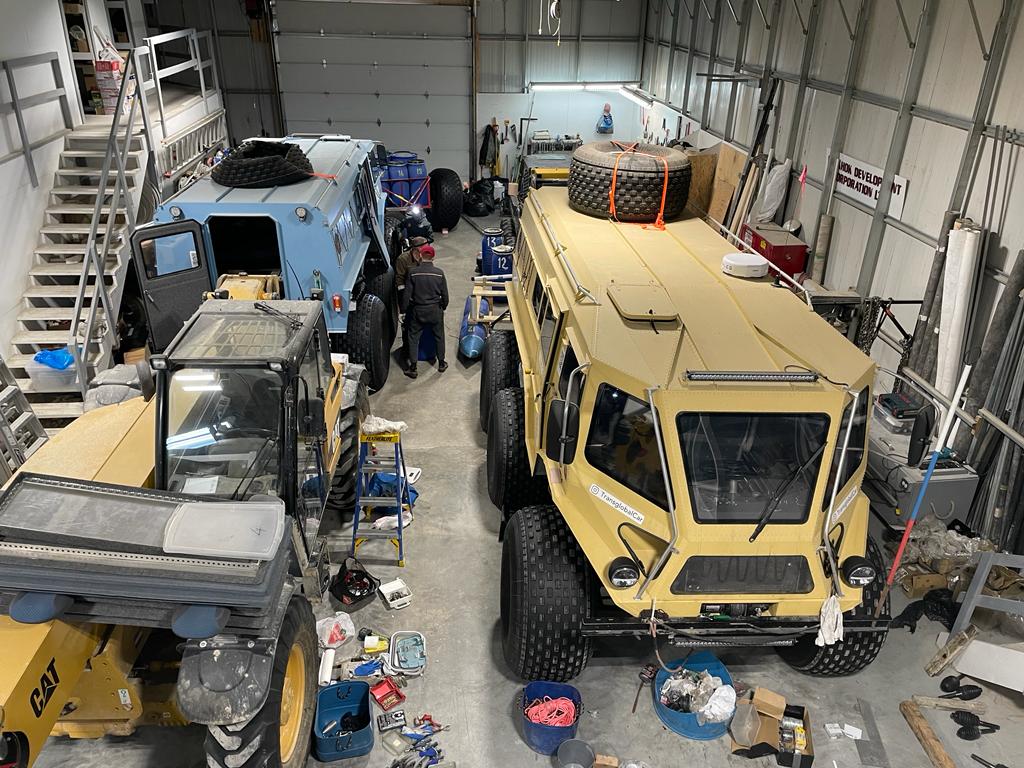
The hero of my today's opus is Alexey Dubinin, a workaholic mechanic, aka a businessman, co-owner of a solid company. Line of activities - construction and cargo transportation. Though in ordinary life he is a CEO, it does not in the smallest degree hamper his ability of masterly operating any machinery occurring on his way, be it an excavator, scraper, fork lift, etc. During the construction of our ATVs, he rendered invaluable assistance in selection of the most diverse parts, including rare ones. He was so fascinated with our project that set off with us without hesitation, leaving his enterprise to the care of his assistants. As a mechanic, he is very meticulous; any job he tackles with is performed as if it were assembling flying vehicles. A sound gentleman. As for shortcomings, due to modest stature, the fuel reserves in his organism run out earlier than in the others, hence refueling is needed more often. The doctor knows this and compensates whenever possible. Today Alexey finished installing the engine in the green vehicle; it was dismantled for replacing the gearbox. As a rule, he is the last who leaves the workshop - proper attitude for long travels. Well, that's enough, I suppose, or else nothing will remain to write about the other crew members.
Emil Grimsson, an Icelander known for his polar automobile expeditions in high latitudes, both in northern and southern hemisphere, arrived from Yellowknife by airplane today. He came to meet his men escorting the "Electric Nissan, from pole to pole". Emil is a many-sided person; he is one of the organizers of our expedition as well. Soon the electric people will be back, and we will listen with bated breath to stories about the difficulties and hardships of polar travel on electric traction.
That's how the matters are. V.Ye.
28.03.2023 Cambridge Bay. Good weather, but there is no sun, it is cloudy. -30°C, gentle refreshing breeze.
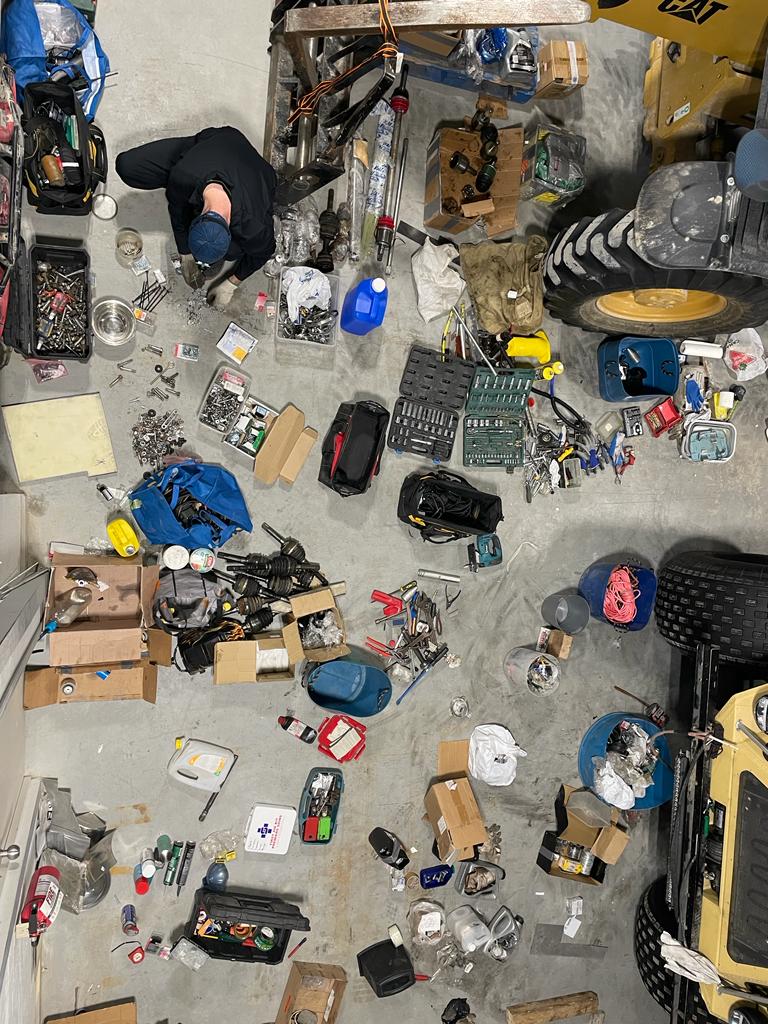
As promised, I am depicting the participants.
Alexey Zaitsev - age 40 years, married, an ecstatic father, slim, which is highly appreciated by the crew due to limited living space. He embodies a rare combination of an engineer and a highly qualified worker, be it welding, turning work or something else. Presently he and Konstantin Alexandrovich are constructing a skid for the ice radar, working for high-level science. When performing creative tasks, Alexey relapses into ardour of perfectionism, and sometimes it is not easy to pull him out of this state painlessly; as a rule, only a new creative task helps. He and his father, also Alexey by name, took the most active part in Emelya project almost from the very beginning. Alexey Jr. is from Dnepropetrovsky region of Ukraine by origin; the climate there is much warmer, but, as he admits, he is ready to endure the cold when there is a group of men who are pleasant to you and who, moreover, are absolutely crazy about the idea of riding in places where it is impossible to ride. On the question: "What's the use of it?" Cyrano de Bergerac answered long ago by saying, in a moment of enlightenment, the immortal: "what is useless, is twice as wonderful", and he knew what he was talking about, I daresay. In addition to "useless", we also want to render unselfish help to glaciological science. Therefore, our trip is not only harmful, but also useful.
Now, a bit of prose. The red vehicle has passed full maintenance, it is ready for the trip, in the evening the volunteers will drive out on the ice to "catch" a round with the skid on its tail, to see how it will feel itself. The yellow vehicle was taken from the airport hangar, there is a list of defects identified last year, we are eliminating them.
That's how the matters are. V.Ye.
26.03.2023 Cambridge Bay. Sunshine, no wind, -25°C. All in all - it's like a resort.
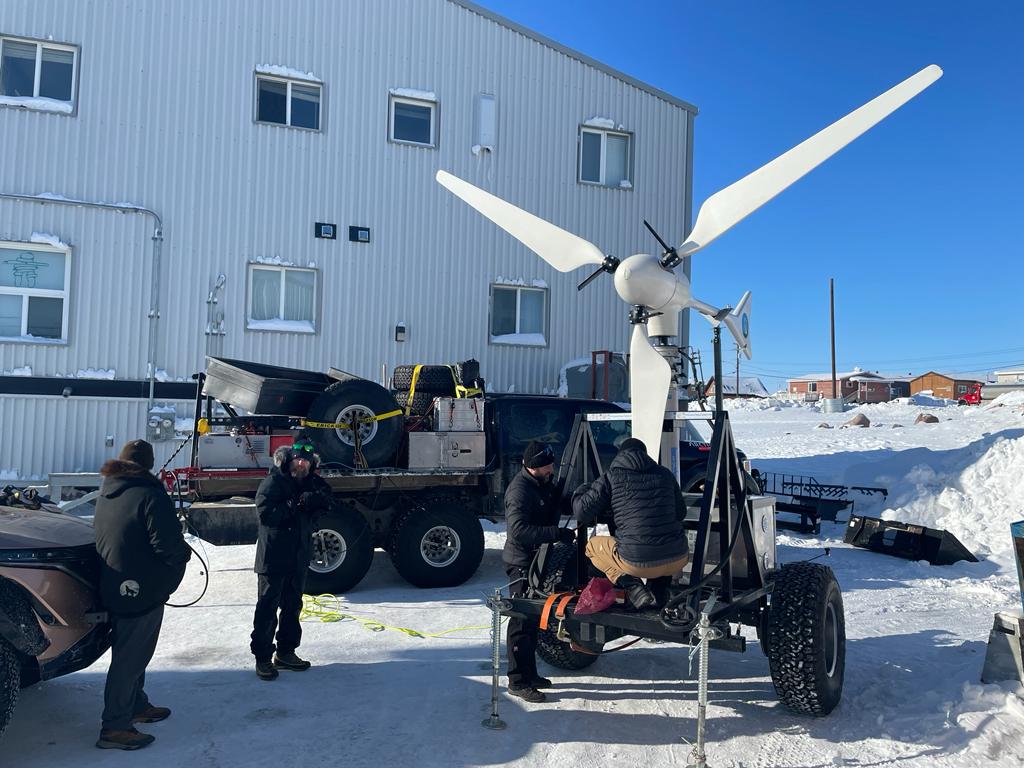
We are fiddling with the vehicles, they always have something to hack upon because perfection has no limits. The green one requires gearbox replacement, it hinted that it's high time to retire. Besides, there are creative tasks as well - to construct a skid for the ice radar. The requirements are simple: it shall have amphibious capability, fit in the trail of the ATV, have the same ground clearance as the ATV, and contain as little metal in the design as possible in order not to interfere with radar operation. We make it of plastic barrels, on the principle of a catamaran. Life will show how viable our brainchild is. Life always shows everything and teaches everything, but, regrettably, sometimes it does it too late.
In the morning, our electrical colleagues from «Nissan Pole to Pole» fixed the blades of the wind generator mounted on a telescopic mast installed on a trailer and set off in a beautiful cavalcade towards adventures. Rotor diameter is no less than 4 meters. It will charge the electric car batteries with energy. The main thing is: to solicit from Mother Nature as much wind as possible. The super-task is: to reach the location of North magnetic pole as of the year 1920 (it is permanently shifting, and at that time was not far away, estimating by local scale), and return back self-sufficiently, which alone is worthy of all respect.
As for the rest, everything is as usual: stroganina of delicious white fish for dinner, a thimble of vodka - actually, it is Sunday - and warm-hearted conversations about spare parts.
Next time I'll start telling about our men, whose restless natures drive someone to high mountains, the other - to high latitudes, though, frankly speaking, in my opinion, their motivation is uncomplicated, not to say primitive. You get sick and tired of tumbling in the cold and wind with wrenches under the vehicle, and returning back home you feel like in paradise ... for two or three weeks, and then it's high time to get off again to refresh the acuity of existence in your memory. That's how they burn the candle at both ends.
That's how the matters are. V.Ye.
25.03.2023 Cambridge Bay, Nunavut, Canada (GMT-6). Clear, -31°C, almost no wind.
At night, two escort cars arrived from Yellowknife as part of the project «Electric Nissan conquers the magnetic pole». Not without adventures: due to snowless winter, the rocky sections of the route were often difficult for them, something got broken, was repaired, they drove further. Attaboy, they managed to get through. The handsome Nissan got to Cambridge Bay, as befits a genuine ATV, by air. Further on it will go on its own. The newcomers are three-axis F-350 6x6 Fords, reputable vehicles, incredible power is felt in everything. We will be watching with interest.
Today I was the winner of the brainstorming session on the topic: «where is our fifth trailer», because in the hangar at the airport we discovered:
- 4 ATVs
- 4 trailers.
But we have FIVE trailers! An airport employee named Randy, when I asked whether he had seen the fifth trailer, replied that yes, he had, a man arrived on a pickup truck and took it away. All of our people breathed a sigh of relief: it was stolen, the solitaire is out. The brainstorming session - where to search for it - started. We choose the logical way, as in the famous Ryazanov's film "A light steam". As a result of superhuman tension of the neurons remaining in my head, I suddenly realized that the trailer being searched for is quietly standing in the hangar, not in Cambridge Bay, but in Resolute where we have left it. I just managed to break the matrix earlier than the others. They don't steal here. And the guy with the pickup truck has taken something of his own, but he played the role of a smoke screen. Well, let us break the matrix further on. Tomorrow is Saturday, but in violation of all the basic laws of the universe, we will work.
That's how the matters are. V.Ye.
Case Record No.2/2023
22.03.2023 Hurray! We got to Cambridge Bay finally.
We flew by Beechcraft 1900D aircraft, quite comfortably, the pilots were two gentlemen wearing technician overalls, about 21-22 years old. The landing was performed skillfully. The weather is clear, invigorating; the hangar with our vehicles and all the junk is nearby. The first thing I did was: rushing to my barrel, taking out my cap with earflaps and the felt boots. Daniela who met us was wearing a baseball cap despite -28°C, while I was searching for cap with earflaps - what a shame, as Shvonder, the chairman of the house committee, used to say. We settled in, everything is organized perfectly, many thanks to Cedric. During the hunt with camera for movie plots, Maxim met a boy of 8 years old on the street, and in course of conversation the boy told that he was following our expedition on the Internet, and dreamed of being among the participants. Once we met a similar wonderful boy in Yar-Sale village on Yamal, he persuaded his mother to subscribe to «4x4 All-wheel drive» magazine just because it published our diaries. In the evening, finally fried nelma (white salmon), then hot-tempered discussion of the problem of composition of foodstuff barrels in the caravans, and the associated problem of petty theft by the members from the barrels of what the soul desires, and the soul always desires something tasty. As everyone knows, the doctor's mood starts to deteriorate due to this, and then it may develop into depression... The problem is serious indeed; during this trip we will try to solve it using different methods, in order to arrange a simple and convenient system for foodstuff packing before start of the big travel.
21.03.2023 Yellowknife.
Wonderful weather. Sunny, windless, -21°C. Morning. During breakfast, Sergey Larin told me confidentially that due to joy caused by occurrence of a spare day, his skin stopped cracking on the grounds of nervousness. Perhaps in the bright future this method will be employed for treating skin diseases, and other diseases as well. We are also welcome in the Buffalo Air company; one enters their hangar, and the mouth stretches into a smile from the sight of different planes standing on the floor, suspended under the ceiling tiny hydroplanes on which they fly to fishing places in summer. We immerse in the atmosphere of goodwill and wish to help. Tonight Zurab leaves by car for Edmonton (1600 km), he will arrange lathing of some items, take something for the Arctic Truck pickup, and will return right away - an iron man, in one word. The purchased fish is of delicatessen sort. When we asked Zurab to get us some game, he said - no problem, we may get venison, ox and even buffalo meat, so it seems that we will not be hungry.
20.03.2023 Yellowknife.
We spent the previous day on the road: Toronto-Vancouver-Yellowknife. In Yellowknife we lodge in the same hotel as last year, we were recognized, we are welcome. This day will become one of the most delightful in the expedition, but we don't know that yet. Laborious hustling around for foodstuffs, packing of all purchased items, time is spare, we are nervous, and suddenly, in course of one of the conversations with Cedric (he is the chief of the project, in particular, responsible for all flights), it turns out that we are leaving one day later than expected, so, we have a spare day. This is called «collective catharsis», fate grants unforgettable moments sometimes!
Case Record No.1/2023
18.03.2023 Toronto.
Doctor is nervous: long life on the road has definitely consolidated his conviction that one should expect only bad development of events, and if this does not happen, then the probability of trouble will only grow with time. Actually Doctor trusts only himself, and even then not completely. As we approach Cambridge Bay which is the starting point of our travel, the nervousness is leaving him also. It is a training trip this year, we will keep a wary eye on fuel consumption, food expenditure and then make conclusions, so that next year we start the main travel with minimum load weight, while having everything we need. A very important and difficult task will be the setup of stable and, if possible, fast Internet connection. That's how the matters are. Till next communication session in Yellowknife.
17.03.2023 Toronto.
Continuation of shopping, purchasing fish from the Slave Lake using e-commerce (thanks to Covid), making dried crusts. We bought real rye bread in a Polish store, chopped it into small pieces, and now the bread spirit reigns in our rooms, and all horizontal surfaces (except the floor) are occupied by the future delicatessen. I phoned Christian Haas, the well-known glaciologist from the Alfred Wegener Institute. In the evening we are dining together. He takes active part in our project, brought an ice radar for measuring ice thickness. Later I will write more about this interesting and useful instrument.
16.03.2023 Toronto.
Hotel. The people around are quite common, without any traces of scalping and other knifing. In the morning, regardless of the 7-hour, and for someone even 10-hour time lag, we set for work, the most difficult and unpleasant sort for a man's heart - roaming from one shop to another with lists of foodstuffs, tools and many other necessary rubbish. Doing this in a Toronto suburb is much easier than in Constantinople: local architecture and tincture will not drive to ecstasy gradually turning into a heart attack or apoplexy, so one is not distracted from the assignment.
15.03.2023
More than 11 hours in the airplane is no trifle. However, closer to the end of the flight, Greenland appeared on the right side, magnificent landscape of exceptional beauty, not like those at the hotel. Mountains sparkling in the sun, glaciers and the sea with ice floes. I walked along the cabin, our group members were dozing; at first I wanted to wake them up, offer them to have a look, but then I thought: why should I share such beauty, let it be only mine, maybe I'll tell them later, in a moment of weakness… This time our group somehow did not arouse any suspicions in the border guard officer, and after learning that we are heading further to Nunavut he completely lost interest in us, and we left for Canada even somewhat slightly disappointed.
14.03.2023 - Istanbul.
The weather is good, +5°C. Late in the evening yesterday the mechanics, operator Maxim, Doctor and your obedient servant met at the hotel. In the morning we were busy buying samples of various little things for testing; after lunch doctor Larin released us to have a last nip of Byzantine culture before submersion for almost two months into North American reality. The doctor is a person with razor-sharp sense of responsibility, he cannot afford wasting time on sighs like «oh, what kind of life those people had...». Our hotel is located near a plastic surgery clinic, and our group stands out unpleasantly from the majority of the hotel guests by having no scars encircling the head, or plasters on the noses, - in general, by plebeian carelessness in regard of our appearance. Well, we are just tractor drivers, it can be seen with unaided eye.